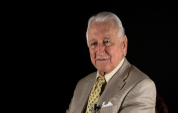3:25 | Aboard a troop ship, Lawrence Snowden found out what it means to be a union chef when he had to finish cooking his own eggs. Then he reveals the reason he loves sardines.
Keywords : Lawrence Snowden USS Jean Lafitte merchant ship union chef D Bar D Ration sardines fish seafood

Lawrence Snowden’s family dentist would regale him with tales of his Marine Corps service and invariably finish by telling him that it would be too tough for him. The young Snowden took this as a challenge.
After a stop at Camp Lejeune, newly commissioned Lieutenant Lawrence Snowden was sent to Camp Pendleton to help put together the new 4th Marine Division. His was the first unit to train at Pendleton.
The first operation for the 4th Division was the landing on Roi-Namur. Lawrence Snowden remembers that, though it was an easy victory, valuable combat experience and important lessons were imparted on the Marines.
On Saipan and Tinian, Lawrence Snowden discovered huge green flies and poor use of artillery. He also had a profoundly moving experience when he heard soft crying coming from a pile of bodies.
Marine Captain Lawrence Snowden learned two things made Iwo Jima a valuable prize for the Allies: its position halfway between B-29 bases in Saipan and Tokyo, and the fact that it was, legally, a part of the Japanese mainland.
During the difficult landing at Iwo Jima, company commander Lawrence Snowden dove into a bomb crater for shelter and found Sgt. Leonard Ash there with a gruesome wound.
Lawrence Snowden was told that the campaign for Iwo Jima would take maybe 5 days. Instead it was 36 long, bloody days and when the flag was raised, no one in his unit stood up and cheered. That Marine would have been a dead Marine.
Iwo Jima was a unique battle in that the victors suffered more casualties than the defeated. Marine Captain Lawrence Snowden says that you came to feel that like it wouldn't happen to you, and that spirit enabled the men to reach their objective.
Lawrence Snowden knew that the machine guns on the wings of the Zero could not be aimed at him, so he stood up in the bomb crater he was using for cover and waved to the pilot of the low flying plane.
Lawrence Snowden was wounded on Iwo Jima and discovered that the policy was to not return any wounded troops to the battle. He wanted to return to his men and persevered because he knew there was always someone around who could change policy.
Captain Lawrence Snowden was transferred to the 3rd Marine Division on Guam, where he readied for the expected invasion of Japan. The commander was Maj. Gen. Graves B. Erskine, who had a reputation as a “tough cookie.”
Lawrence Snowden points out that the lasting effects of WWII go far beyond the fighting. The makeup of America’s labor force was forever changed, as women stepped up, and provincial attitudes were swept away.
Lawrence Snowden was one of only 95,000 active Marines when war broke out in Korea, drawn down from a force of over 500,000. His superiors wanted him to stay in his planning role, but he pushed for a transfer to the action.
During the Korean War, Lawrence Snowden visited postwar Japan for the first time. During a train ride from Kyoto to Tokyo, he became aware of an essential truth regarding wartime enemies.
In Vietnam, Regimental Commander Lawrence Snowden saw the dirty part of the war operating down in the Delta. Later, working at HQ making bombing assessments, he began to realize the aerial assault on the North was not working.
Lawrence Snowden had a long and varied career as a Marine officer, but the most important lesson on leadership, he learned as a newly commissioned 2nd Lieutenant at Camp Lejeune. His men were not there to serve him. He was there to serve them.